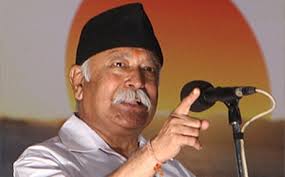In RSS Chief Mohan Bhagwat’s Speech, Two Controversies And a Hint of Poll Strategy
 MUMBAI/NEW DELHI In one speech, Mohan Bhagwat, the chief of the Rashtriya Swayamsevak Sangh or the RSS, has delivered two political controversies.At a function in Mumbai on Sunday, Mr Bhagwat said, “For the next 5 years we have to work with the aim of bringing equality among all the Hindus in the country. All Hindus should be drinking water at one place, should be praying at one place and after their death, their bodies should be burnt at the same place.”
MUMBAI/NEW DELHI In one speech, Mohan Bhagwat, the chief of the Rashtriya Swayamsevak Sangh or the RSS, has delivered two political controversies.At a function in Mumbai on Sunday, Mr Bhagwat said, “For the next 5 years we have to work with the aim of bringing equality among all the Hindus in the country. All Hindus should be drinking water at one place, should be praying at one place and after their death, their bodies should be burnt at the same place.”
The RSS is the ideological mentor of Prime Minister Narendra Modi’s BJP.
In the RSS chief’s comment, many read a political strategy to win over Dalits and consolidate Hindu votes in Maharashtra and Haryana – a factor that is believed to have contributed to the BJP’s sweep in Uttar Pradesh in the national election.In a campaign fronted by Mr Modi’s close aide Amit Shah, now BJP chief, the party won 71 of 80 seats in UP, India’s most politically vital state.
The polarization of Hindu votes after the Muzaffarnagar communal violence last year was seen to have dissolved deep-rooted caste lines in the state and helped the BJP, which has for years been perceived as a party for upper caste Hindus.In the absence of a divisive factor like the Muzaffarnagar riots, the BJP is reportedly banking on the “equality among Hindus” mantra in Maharashtra and Haryana.
Another remark by the RSS chief at the same function has provoked strong political reactions. “Hindustan Hindu Rashtra Hai (India is a country of Hindus),” Mr Bhagwat said, repeating what he had said last week.
Union minister Ram Vilas Paswan – a BJP ally who has been uncomfortable with the RSS-led Sangh’s pro-Hindu agenda in the past – said, “Everybody has an agenda and the RSS is pursuing its own agenda but it’s a BJP-led government and PM Modi has not said anything controversial in the past one year.”According to Congress leader Manish Tewari “It is very evident that with the active connivance of the central government there is an attempt towards religious polarisation.”

